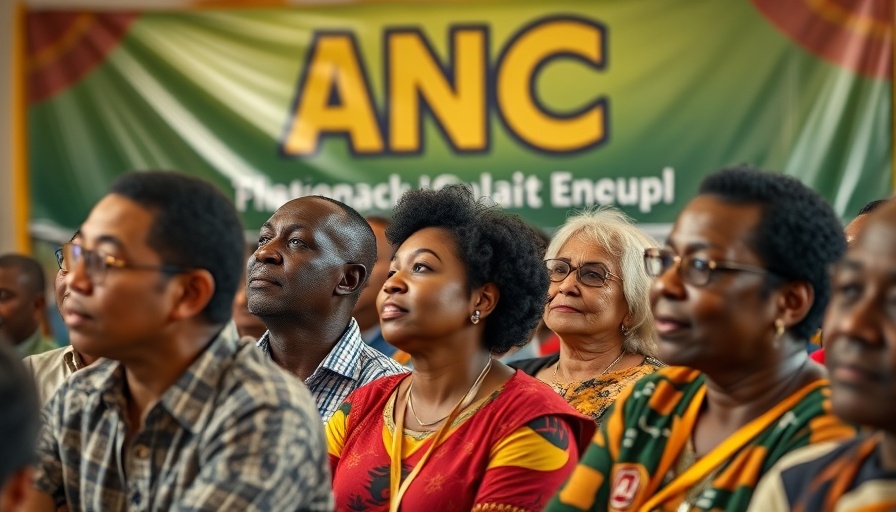
A New Era for the ANC: Political Stability or Strife in Free State?
In a critical moment in South Africa's political landscape, the African National Congress (ANC) has announced that there will be no reconfiguration in its approach to governance in the Free State. This comes on the heels of the party's recent losses in national elections, where it dropped to a historic low of 40% of the electoral vote. Despite the pressure for change, the ANC maintains a steadfast stance that they'll continue to govern without major alterations to their current strategy.
The political implications of this decision could ripple through the region. As the ANC grapples with a diminishing support base, the question arises: can the ruling party sustain its authority amid escalating challenges like service delivery protests, unemployment, and corruption?
Understanding the ANC's Position in South African Politics
The ANC has long been heralded as the party of liberation, led by figures such as Nelson Mandela. However, since its peak in 2004, the party has suffered a steep decline in public trust. According to the results from the recent national elections, political dissatisfaction has led to a noteworthy shift in various provinces, particularly in the economically pivotal Free State and KwaZulu-Natal (KZN).
The ANC's dwindling power has opened the floor for coalition politics, marking a departure from their historical dominance. While the party remains the largest in Parliament even post-elections, its lack of a majority forces it to consider coalitions seriously. This uncertainty may influence public sentiment, inviting opportunities for its opponents such as the Democratic Alliance (DA) and Economic Freedom Fighters (EFF).
The Role of Coalitions in Future Governance
Coalition politics may well be the key to reshaping governance. The emergence of new political entities, like the uMkhonto we Sizwe (MK), indicates a diversification of voter preference fueled by disenchantment with the current government. With rising political competition, parties like the DA, EFF, and MK are challenging the ANC's policies and pushing for reforms that could affect governance structures significantly.
Chris McGrath and Jakkie Cilliers from ISS Africa argue that the future of South African politics might hinge on the nature of coalitions formed, particularly between the ANC, DA, and emerging factions. Growing dissatisfaction among the electorate showcases a need for a government that prioritizes accountability and transparency over patronage—a shift that could compel the ANC to reconsider its current top-down approach.
Economic Implications of Continued ANC Governance
The economic landscape is equally critical. The Free State has experienced socioeconomic challenges that compound political strife. With unemployment rates climbing and service delivery becoming increasingly sporadic, the ANC's inability to address these issues could prompt greater civil unrest and decreased investor confidence.
The government’s handling of the Eskom crisis—a vital issue causing ongoing load shedding—has also been central to public discontent. Absent a tangible recovery plan, South Africa risks further economic decline, making it even harder for the ANC to regain public support in light of heavy criticisms surrounding its governance.
Looking Toward the Future of ANC and Free State Politics
As the ANC braces for the complexities of coalition governance, it must also navigate burgeoning social issues: from the need for equitable education reforms to effective healthcare delivery. The party's rigidity in sticking to outdated policies may impede necessary reforms that many South Africans are clamoring for.
A shift towards a government of national unity, which has been posited as a potential solution, could indeed pave the way for a more collaborative approach to governance. This model might garner support among previously marginalized groups and signal a newfound commitment to public accountability.
Conclusion: The Imperative for Change
Ultimately, the ANC's current strategy in the Free State may hold significant implications for the future of South Africa's democratic fabric. The potential for recovery hinges on the ruling party's acceptance of public sentiment and its adaptability to changing political dynamics. For the ANC, embracing change may be the only viable way forward amid escalating challenges defined by economic hardship and public unrest.
As stakeholders and citizens alike watch developments unfold, the pressure for political reform mounts. The path ahead will require a balanced approach that recognizes and cultivates inclusivity while prioritizing the needs of the South African populace.
 Add Row
Add Row  Add
Add 




Write A Comment